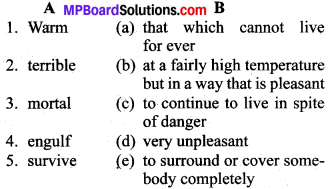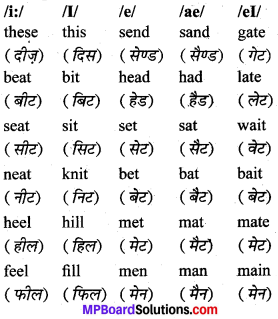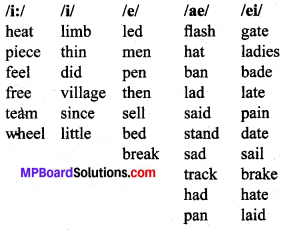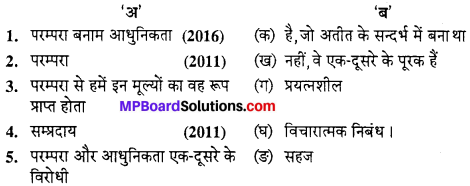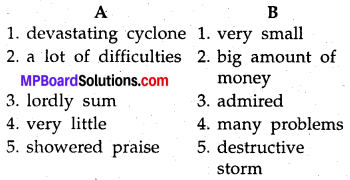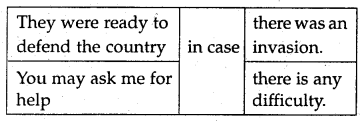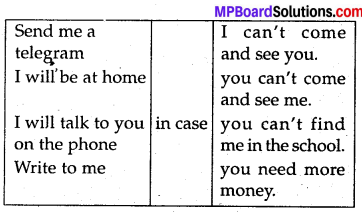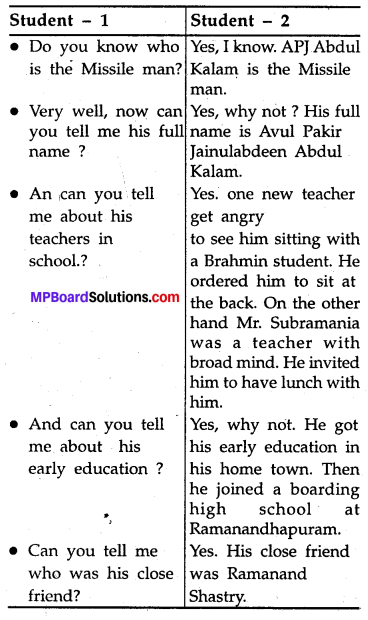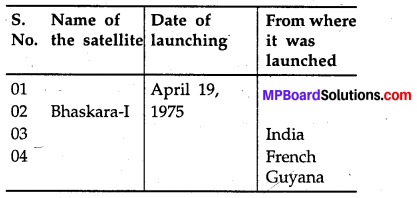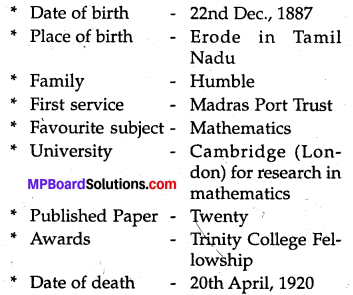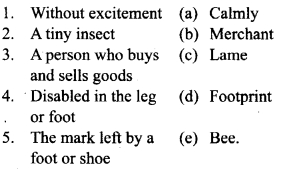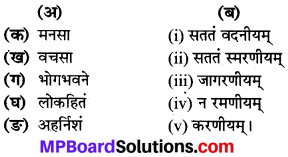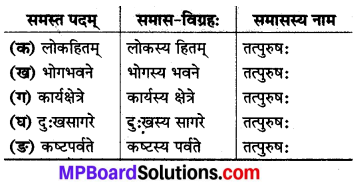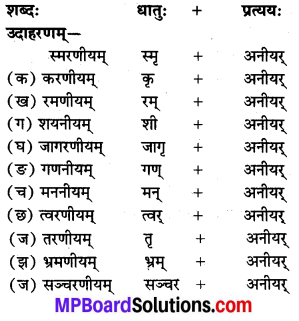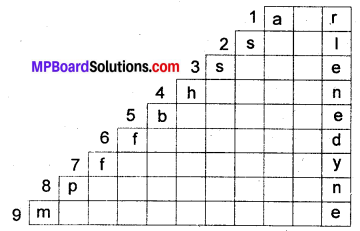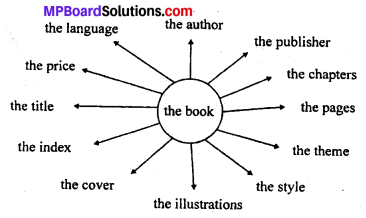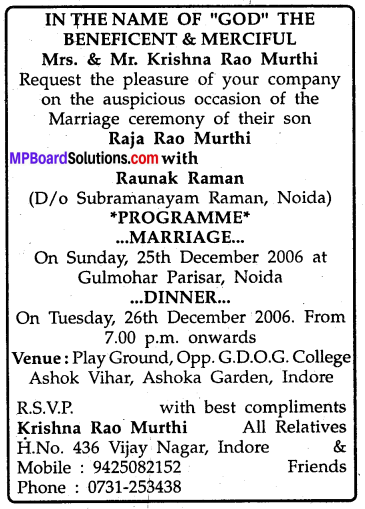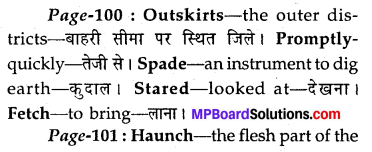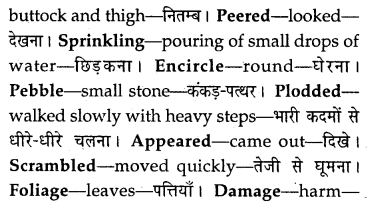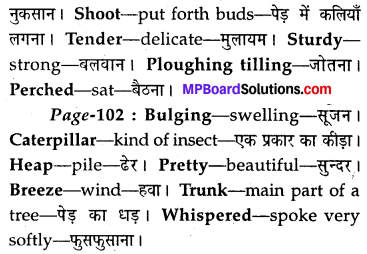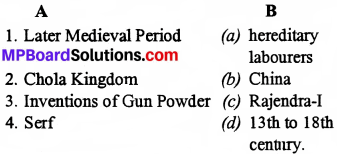MP Board Class 10th Hindi Navneet Solutions गद्य Chapter 2 महापुरुष श्रीकृष्ण (निबन्ध, वासुदेव शरण अग्रवाल)
महापुरुष श्रीकृष्ण अभ्यास
बोध प्रश्न
महापुरुष श्रीकृष्ण अति लघु उत्तरीय प्रश्न
प्रश्न 1.
“कृष्ण द्वैपायन” को देश किस नाम से जानता है?
उत्तर:
“कृष्ण द्वैपायन” को देश महर्षि वेदव्यास के नाम से जानता है।
प्रश्न 2.
भारतीय साहित्य का एक बड़ा भाग किस। चरित्र से अनुप्राणित है?
उत्तर:
भारतीय साहित्य का एक बड़ा भाग कृष्ण चरित्र। से अनुप्राणित है।
प्रश्न 3.
गीता शास्त्र के महान् उपदेशक कौन हैं?
उत्तर:
गीता शास्त्र के महान् उपदेशक श्रीकृष्ण हैं।
प्रश्न 4.
कृष्ण, बलदेव और कुन्ती पाण्डवों के घनिष्ठ सम्बन्धों का सूत्रपात किस स्थान पर हुआ?
उत्तर:
कृष्ण, बलदेव और कुन्ती पाण्डवों के घनिष्ठ सम्बन्धों का सूत्रपात हस्तिनापुर पर हुआ।
प्रश्न 5.
कृष्ण ने शिशुपाल का वध कर माहिष्मति की गद्दी पर किसे बैठाया?
उत्तर:
कृष्ण ने शिशुपाल का वध कर माहिष्मति की गद्दी पर उसके पुत्र धृष्टकेतु को बैठाया।
महापुरुष श्रीकृष्ण लघु उत्तरीय प्रश्न
प्रश्न 1.
भारतीय राष्ट्रीय जीवन पर किन दो समकालीन व्यक्तियों के उदात्त मस्तिष्क की गहरी छाप है?
उत्तर:
भारतीय राष्ट्रीय जीवन पर द्वैपायन कृष्ण और वसुदेव पुत्र कृष्ण के उदात्त मस्तिष्क की छाप है। संयोग से ये दोनों ही कृष्ण थे।
प्रश्न 2.
महर्षि वेद व्यास क्यों प्रसिद्ध हैं?
उत्तर:
महर्षि वेद व्यास ने महाभारत की रचना की है। इनके मस्तिष्क की अप्रतिहत प्रतिभा से आज तक हमारे धार्मिक जीवन और विश्वासों का प्रत्येक अंग प्रभावित है।
प्रश्न 3.
श्रीकृष्ण ने एक-दूसरे ही प्रकार के जगत में कब प्रवेश किया?
उत्तर:
बाल्यकाल की रमणीय लीलाओं को करने के बाद श्रीकृष्ण ने एक-दूसरे ही प्रकार के जगत में प्रवेश किया। वे वृन्दावन त्यागकर मथुरा आ गये। यहीं उनका साक्षात्कार जीवन के कठोर सत्यों से हुआ।
प्रश्न 4.
मस्तिष्क साधना हेतु श्रीकृष्ण कहाँ गये, वहाँ उन्हें क्या लाभ हुआ?
उत्तर:
मस्तिष्क साधना हेतु वे सान्दीपनि गुरु के गुरुकुल में प्रविष्ट हुए। कुल पुरोहित गर्गाचार्य और काशी के विद्याचार्य सान्दीपनि गुरु का श्रीकृष्ण पर विशेष प्रभाव था।
प्रश्न 5.
कृष्ण जन्म सम्बन्धी कुछ तथ्य लिखिए।
उत्तर:
कृष्ण जन्म सम्बन्धी कुछ तथ्य इस प्रकार हैं। उनका जन्म अष्टमी, बुधवार रोहिणी नक्षत्र में आधी रात के समय अपने मामा कंस के बन्दीगृह में हुआ था।
प्रश्न 6.
श्रीकृष्ण हस्तिनापुर क्यों गये? हस्तिनापुर जाकर कृष्ण ने क्या किया?
उत्तर:
श्रीकृष्ण और बलराम कुरुक्षेत्र में स्नान के लिए गये हुए थे। संयोग से कुन्ती भी पाण्डवों के संग आई हुई थी। वहाँ कृष्ण और पाण्डवों के बीच घनिष्ठ सम्बन्ध का सूत्रपात हुआ।
महापुरुष श्रीकृष्ण दीर्घ उत्तरीय प्रश्न
प्रश्न 1.
“श्रीकृष्ण का बाल-जीवन तो एक काव्य ही है”-इस उक्ति को सिद्ध कीजिए।
उत्तर:
कृष्ण का बाल-जीवन तो एक काव्य ही है। इस उक्ति का अभिप्राय यह है कि जन्म से लेकर अथवा उससे पूर्व ही, उनके सम्बन्ध के अतिमानवी चरित्रों का क्रम आरम्भ हो गया था। हमारे देश के बाल-वर्ग के लिए तो इन कथाओं की रसमय सामग्री अत्यन्त प्रिय वस्तु है। यमुना नदी और उसके समीप के पीलु वृक्षों पर लहलहाती हुई लताओं के कुंजों में कृष्ण के बाल चरित्र की प्रतिध्वनि आज भी जीवित कथाओं के रूप में देखने को मिलती है।
प्रश्न 2.
श्रीकृष्ण ने रमणीय बाल चरित्रों की सुखदायी भूमिका के रूप में कौन-कौन से कार्य किये?
उत्तर:
वृन्दावन में श्रीकृष्ण द्वारा बाल सखाओं के साथ की गयी बाल लीलाएँ, यमुना नदी और उसके कुंजों में रची गयी क्रीड़ाएँ, यमुना के कछारों में संगीत एवं नृत्य की चेष्टाएँ आदि सुखदायी भूमिका के रूप में की गयी थीं।
प्रश्न 3.
हस्तिनापुर से सम्पर्क के पश्चात् श्रीकृष्ण को जो अनुभव हुआ, उसे अपने शब्दों में लिखिए।
उत्तर:
हस्तिनापुर से सम्पर्क के पश्चात् श्रीकृष्ण और पाण्डवों के बीच घनिष्ठ सम्बन्ध का सूत्रपात हुआ जिसके कारण आज तक योगेश्वर कृष्ण और धनुर्धर पार्थ एक साथ स्मरण किये जाते हैं। कंस वध के समय ही कृष्ण अपनी राजनीतिक प्रवृत्ति का परिचय दे चुके थे। हस्तिनापुर की राजधानी के साथ सम्पर्क होने के बाद उस प्रवृत्ति को और भी उत्तेजना मिली।
प्रश्न 4.
श्रीकृष्ण के बुद्धि कौशल के आगे कौन-कौन से अराजक व्यक्तित्व परास्त हुए?
उत्तर:
श्रीकृष्ण के बुद्धि कौशल के आगे जरासंध, शिशुपाल, शाल्वराज, भौमनरक, मुर, वाणासुर, कलिंगराज और काशीराज जैसे अराजक व्यक्तित्व परास्त हुए।
प्रश्न 5.
“महाभारत का युद्ध भारतीय इतिहास की एक दारुण घटना है”-इस उक्ति की सार्थकता में अपने विचार प्रकट कीजिए।
उत्तर:
महाभारत का युद्ध भारतीय इतिहास की एक दारुण घटना है। इस प्रलयकारी युद्ध में दुर्योधन की ओर से गान्धार, वाल्हीक, काम्बोज, कैकय, सिंधु, मद्र, त्रिगर्त आदि देशों के योद्धा लड़े थे। युधिष्ठिर की ओर से विराट, पांचाल, काशि, चेटि, संजय आदि वंशों के योद्धा लड़े थे। ऐसे भयंकर विनाश को रोकने के लए कृष्ण से जो प्रयत्न हो सकता था, उन्होंने किया। पर वह प्रलयकारी युद्ध रुक न सका।
प्रश्न 6.
श्रीकृष्ण को सोलह कलाओं का अवतार क्यों कहा गया है?
उत्तर:
श्रीकृष्ण भारतीय जनमानस में सोलह कलाओं के अवतार माने जाते हैं। इसका तात्पर्य यह है कि जिस प्रकार भिन्न-भिन्न वस्तुओं के नापने के लिए भिन्न-भिन्न परिमाण (मापक यन्त्र) होते हैं, उसी प्रकार मानवी पूर्णता को प्रकट करने के लिए कला की नाप है। सोलह कलाओं से चन्द्रमा का स्वरूप सम्पूर्ण होता है। मानवी आत्मा का पूर्णतम विकास भी सोलह कलाओं के द्वारा प्रकट किया जाता है। कृष्ण में सोलह कलाओं की अभिव्यक्ति थी अर्थात् मनुष्य का मस्तिष्क मानवीय विकास का जो पूर्णतम आदर्श बना सकता है, वह हमें कृष्ण में मिलता है।
महापुरुष श्रीकृष्ण भाषा अध्ययन
प्रश्न 1.
निम्नलिखित शब्दों का समास विग्रह कीजिए
उत्तर:
- देवकी पुत्र = देवकी का पुत्र = तत्पुरुष समास।
- कृष्ण चरित्र = कृष्ण का चरित्र = तत्पुरुष समास।
- बन्दी गृह = बन्दी का गृह = तत्पुरुष समास।
- मेघ माला = मेघों की माला = तत्पुरुष समास।
- प्रतिध्वनि = प्रति + ध्वनि = अव्ययीभाव समास।
महापुरुष श्रीकृष्ण महत्त्वपूर्ण वस्तुनिष्ठ प्रश्न
महापुरुष श्रीकृष्ण बहु-विकल्पीय प्रश्न
प्रश्न 1.
कृष्ण का जन्म आज से कितने सहस्र वर्ष पूर्व हुआ था?
(क) पाँच सहस्र वर्ष
(ख) बीस सहस्र वर्ष
(ग) तीन सहस्र वर्ष
(घ) दस सहस्र वर्ष
उत्तर:
(क) पाँच सहस्र वर्ष
प्रश्न 2.
श्रीकृष्ण के बड़े भाई का नाम था
(क) नन्द
(ख) वासुदेव
(ग) गोपालक
(घ) बलराम।
उत्तर:
(घ) बलराम।
प्रश्न 3.
शिशुपाल दुष्ट और अत्याचारी तो था ही, साथ ही वह समर्थक था
(क) अर्जुन का
(ख) भीम का
(ग) दुर्योधन का
(घ) कृष्ण का।
उत्तर:
(ग) दुर्योधन का
प्रश्न 4.
श्रीकृष्ण ने निर्मोचन नामक राजधानी में सेना सहित मुर और नरक का वध करके किस प्रदेश को स्वतन्त्र किया?
(क) आसाम
(ख) कामरूप
(ग) उत्तर भारत
(घ) दक्षिण भारत।
उत्तर:
(ख) कामरूप
प्रश्न 5.
यह कथन किसका है-“कौरवों और पाण्डवों में बिना वीरों का नाश हुए ही शान्ति हो जाय यही मैं प्रार्थना करने आया हूँ।”
(क) कृष्ण
(ख) गांधारी
(ग) कुन्ती
(घ) धृतराष्ट्र।
उत्तर:
(क) कृष्ण
रिक्त स्थानों की पूर्ति
- महाभारत का युद्ध भारतीय इतिहास की बहुत ही …….. घटना है।
- कंस को राज्यच्युत करके कृष्ण ने …………. को सिंहासन पर प्रतिष्ठित किया।
- यदि मुझे वजधारी इन्द्र और कृष्ण में से एक को लेना पड़े तो मैं ………….. को लूँगा।
- दुर्योधन ने सब कुछ सुनकर कहा-“मैं ………….. के बराबर भी भूमि पाण्डवों के लिए नहीं छोड़ सकता।”
- ………… को हमारे देश के लेखकों ने सोलह कला का अवतार कहा है। (2016)
उत्तर:
- दारुण
- उग्रसेन
- कृष्ण
- सुई की नोंक
- कृष्ण।
सत्य/असत्य
- श्रीकृष्ण को सोलह कलाओं का अवतार कहा जाता है। (2012)
- कौरवों और पाण्डवों का युद्ध महाभारत के नाम से प्रसिद्ध है।
- गीताशास्त्र के उपदेशक दुर्योधन हैं।
- अर्जुन ने शिशुपाल का वध किया क्योंकि वह अत्याचारी शासक था।
- श्रीकृष्ण भारत की अमूल्य निधि हैं और वे भारतीय संस्कृति के गौरव हैं।
उत्तर:
- सत्य
- सत्य
- असत्य
- असत्य
- सत्य।
सही जोड़ी मिलाइए
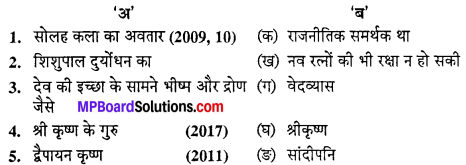
उत्तर:
1. → (घ)
2. → (क)
3. → (ख)
4. → (ङ)
5. → (ग)
एक शब्द/वाक्य में उत्तर
- द्वैपायन कृष्ण को संसार किस नाम से जानता है? (2009)
- उग्रसेन के लोक पीड़ित पुत्र का क्या नाम था? (2011)
- पाण्डवों की माता का क्या नाम था?
- श्रीकृष्ण मस्तिष्क साधना हेतु किसके पास गये थे?
- श्रीकृष्ण सन्धि का प्रस्ताव लेकर कहाँ गये?
- गीताशास्त्र के महान् उपदेशक कौन है? (2013, 15)
उत्तर:
- वेदव्यास
- कंस
- कुन्ती
- गुरु सान्दीपनि
- हस्तिनापुर की राजसभा में
- श्रीकृष्ण।
महापुरुष श्रीकृष्ण पाठ सारांश
भारतवर्ष में जिस महापुरुष के चरित्र से मानव जाति की भावनाओं, विचारों पर अमिट प्रभाव पड़ा है,उनमें श्रीकृष्ण’ का नाम सबसे ऊँचे शिखर पर है। आज से करीब पाँच हजार साल पूर्व एक ही समय में ऐसे दो महापुरुषों का जन्म भारत भूमि पर हुआ जिनके मस्तिष्क की छाप राष्ट्रीय जीवन पर आज भी स्थायी रूप से अंकित है। संयोग से उन दोनों का नाम ‘कृष्ण’ था। इनमें एक ‘द्वैपायन कृष्ण’ नाम से प्रसिद्ध हैं,जो महर्षि वेद-व्यास के नाम से जाने जाते हैं। दूसरे देवकी के पुत्र ‘श्रीकृष्ण’ थे जिन्हें मात्र ‘कृष्ण’ नाम से सम्बोधित किया जाता है।
कृष्ण की बाललीलाओं के हृदयस्पर्शी आख्यान, गीताशास्त्र के गूढ़ उपदेश तथा महाभारत के युद्ध में इनके विभिन्न प्रकार के कार्यों की कहानियाँ आज भी जीवन्त हैं। अष्टमी तिथि बुधवार, रोहिणी नक्षत्र योग के समय आधी रात के समय अपने मामा कंस के बन्दीगृह में कृष्ण ने जन्म लिया। उनका अधिकांश समय देश को अत्याचार एवं पीड़ाओं से मुक्त करने में व्यतीत हुआ। कृष्ण का बालजीवन एक काव्य-सा ही है। वृंदावन को त्यागकर मथुरा आने के समय तक उनकी बाल-लीलाएँ सुन्दर,सरस एवं सुखद हैं। यमुना नदी और उसके निकट के वृक्ष एवं बेलों पर उनके बाल चरित्रों की प्रतिध्वनि आज भी गुंजायमान है। मस्तिष्क की साधना हेतु सान्दीपनि मुनि के गुरुकुल में प्रवेश लिया।
सान्दीपनि ने विद्या के समाप्त होने पर कृष्ण को सत्य एवं धर्म के पथ पर चलने का उपदेश देकर विदा किया। इसके पश्चात् राजनीति में प्रवेश करके अनेक अत्याचारियों को मौत के घाट उतारा। कृष्ण की राजनीतिक सूझ-बूझ अद्भुत थी,इस सम्बन्ध में अर्जुन का यह कथन है-
“कृष्ण मन से जिसका अभिनन्दन करें, वह समस्त शत्रुओं पर विजयी होगा। महाभारत का युद्ध भारतीय इतिहास की एक दारुण घटना है। इसमें अनेक योद्धा धराशायी हुए। श्रीकृष्ण ने दुर्योधन से पाण्डवों को राज्य का कुछ भाग देने के लिए कहा लेकिन दुराग्रही दुर्योधन ने उनकी बात स्वीकार नहीं की फलस्वरूप महाभारत का युद्ध हुआ तथा कौरवों को पराजय का सामना करना पड़ा। कृष्ण सोलह कलाओं के अवतार हैं। वे मानवीय मूल्यों, आदर्शों एवं गुणों की अमूल्य निधि हैं। वे हमारी राष्ट्रीय संस्कृति के सर्वोत्तम रक्षक एवं प्रतिनिधि हैं। जिस प्रकार पूरब एवं पश्चिम के सागरों के मध्य प्रदेश को व्याप्त करके गिरिराज हिमालय पृथ्वी के मानदण्ड की भाँति सुशोभित है तद्नुरूप ब्रह्मधर्म एवं क्षात्रधर्म इन दो मर्यादाओं के मध्य श्रीकृष्ण चरित्र पूर्ण मानवी विकास का परिचायक है। भारत के जन-जन के मस्तिष्क में उनकी लीलाएँ,कलाएँ तथा अद्भुत राजनीतिक सूझ-बूझ की ज्योति आज भी प्रकाशमान है।
महापुरुष श्रीकृष्ण संदर्भ-प्रसंगसहित व्याख्या
(1) भातरवर्ष के जिन महापुरुषों का मानव-जाति के विचारों पर स्थायी प्रभाव पड़ता है, उनमें श्रीकृष्ण का स्थान प्रमुख है। आज से लगभग पाँच सहस्र वर्ष पूर्व एक ही समय में ऐसे दो व्यक्तियों का जन्म हुआ जिनके उदात्त मस्तिष्क की छाप हमारे राष्ट्रीय जीवन पर बहुत गहरी पड़ी है। संयोग से उन दोनों का नाम कृष्ण था। समकालीन इतिहास-लेखकों ने दोनों को भेद करने के लिए एक को ‘द्वैपायन कृष्ण’ कहा है, जिन्हें आज सारा देश महर्षि वेद-व्यास के नाम से जानता है और जिनके मस्तिष्क की अप्रतिहत् प्रतिभा से आज तक हमारे धार्मिक जीवन और विश्वासों का प्रत्येक अंग प्रभावित है। दूसरे देवकी पुत्र श्रीकृष्ण थे, जिन्हें अब वास्तव में ‘कृष्ण’ के नाम से पुकारते हैं।
कठिन शब्दार्थ :
स्थायी = हमेशा टिका रहने वाला। सहस्र = हजार। उदात्त = ऊँचे, महान्। अप्रतिहत् = अबाधित, जिसे कोई भी किसी प्रकार न रोक पाये। प्रतिभा = ज्ञान।।
सन्दर्भ :
प्रस्तुत गद्यांश हमारी पाठ्य-पुस्तक के पाठ, ‘महापुरुष श्रीकृष्ण’ से लिया गया है। इसके लेखक श्री वासुदेव शरण अग्रवाल हैं।
प्रसंग :
इस अंश में लेखक ने भारत में जन्मे दो कृष्णों के महत्त्व के बारे में बताया है।
व्याख्या :
श्री वासुदेव शरण अग्रवाल जी कहते हैं कि भारतवर्ष के जिन महापुरुषों का मानव जाति के विचारों पर स्थायी प्रभाव पड़ा है, उनमें श्रीकृष्ण का नाम महत्त्वपूर्ण है। आज से लगभग पाँच हजार वर्ष पूर्व भारत देश में एक ही समय पर दो व्यक्तियों ने जन्म लिया और इन दोनों के उदात्त मस्तिष्क की छाप हमारे राष्ट्रीय जीवन पर बहुत गहरी पड़ी है। इन दोनों महापुरुषों का नाम कृष्ण था। इतिहासकारों ने इनके अन्तर को स्थापित करते हुए एक को द्वैपायन कृष्ण अर्थात् महर्षि वेद व्यास कहा है और जिनके मस्तिष्क की अद्वितीय प्रतिभा से हमारे धार्मिक जीवन तथा विश्वासों का प्रत्येक अंग प्रभावित है। दूसरे कृष्ण, वासुदेव और देवकी के पुत्र थे जिन्हें आज सारा संसार ‘कृष्ण’ के नाम से ही जानता है।
विशेष :
- लेखक ने द्वैपायन कृष्ण और देवकी पुत्र कृष्ण के अन्तर को स्पष्ट किया है।
- भाषा सहज एवं सरल है।
(2) उस काल के जो भी उच्छृखल, लोकपीड़क सत्ताधारी थे, उन सबसे ही एक-एक करके कृष्ण की टक्कर हुई। जिस महापुरुष ने योग-समाधि के आदर्श को लेकर ब्रह्म स्थिति प्राप्त करने का उपदेश दिया हो, जिसका अपना जीवन अविचल ज्ञान-निष्ठा का सर्वोत्तम उदाहरण हो, उसके जीवन में कंस-निपात से लेकर निज वंश के विनाश तक की . कथा एक अत्यन्त करुण कहानी के रूप में पिरोई हुई है।
कठिन शब्दार्थ :
उच्छृखल = उद्दण्ड, धृष्ट। लोकपीड़क = समाज को पीड़ा देने वाले, जनता को दुःख देने वाले। सत्ताधारी = राजा, शासक। अविचल = अडिग। कंस-निपात = कंस के नाश।
सन्दर्भ :
पूर्ववत्।
प्रसंग :
इस कथा में लेखक ने कृष्ण के महान् कार्यों का वर्णन किया है।
व्याख्या :
लेखक श्री वासुदेव शरण अग्रवाल कहते हैं कि उस काल में जितने भी उद्दण्ड तथा जनता का शोषण करने वाले, उन्हें कष्ट देने वाले शासक थे, उन सभी से एक-एक करके श्रीकृष्ण का संघर्ष हुआ और अन्त में उन्होंने विजय भी प्राप्त की। जिस महापुरुष अर्थात् श्रीकृष्ण ने योग-समाधि के आदर्श को लेकर ब्रह्म स्थिति प्राप्त करने का उपदेश दिया हो, जिसका स्वयं का जीवन अडिग भाव से ज्ञान निष्ठा का सर्वश्रेष्ठ उदाहरण रहा हो, उसके जीवन में कंस के विनाश से लेकर अपने यदुवंश के विनाश तक की कथा एक अत्यन्त करुण कहानी के रूप में पिरोई हुई है।
विशेष :
- लेखक ने श्रीकृष्ण के लोकोपकारी कार्यों की ओर संकेत किया है।
- भाषा भावानुकूल है।
(3) कृष्ण का बाल-जीवन तो एक काव्य ही है। जन्म से लेकर अथवा उससे पूर्व ही, उनके सम्बन्ध के अतिमानवी चरित्रों का क्रम आरम्भ हो गया था और उनके वृन्दावन छोड़कर मथुरा आने के समय तक ये बाल-लीलाएँ आकाश में एकत्रित होने वाली सुन्दर सुखद मेघमालाओं की भाँति नाना वर्ण और रूपों से संचित होती रहीं। बिना कहे ही उन्हें हम जानते हैं।
कठिन शब्दार्थ :
अतिमानवी = अलौकिक, मानवीय क्रियाओं से परे। सुखद = सुख देने वाली। मेघ मालाओं = बादलों की पंक्तियों। नाना वर्ण = अनेक रंगों।
सन्दर्भ :
पूर्ववत्। प्रसंग-लेखक ने कृष्ण के बाल्यकाल की अद्भुत एवं अलौकिक घटनाओं की ओर संकेत किया है।
व्याख्या :
लेखक श्री वासुदेव शरण अग्रवाल कहते हैं कि श्रीकृष्ण के बाल जीवन की घटनाओं पर यदि हम दृष्टि डालें तो हम देखते हैं कि वे घटनाएँ तो अपने आप में एक काव्य ही हैं। जन्म से लेकर अथवा जन्म से पूर्व ही उनकी अलौकिक क्रियाओं एवं चरित्रों का वर्णन आरम्भ हो गया था। वृन्दावन छोड़कर मथुरा आने तक की उनकी सभी बाल लीलाएँ आकाश में छायी रहने वाली सुन्दर मेघ पंक्ति के समान अनेकानेक भावों और रूपों को अपने में समेटे हुए थीं। उनकी इन बाल लीलाओं एवं अलौकिक या अमानवीय चेष्टाओं को हम बिना कहे ही भली-भाँति जानते हैं।
विशेष :
- लेखक ने श्रीकृष्ण की अद्भुत बाल-लीलाओं की ओर संकेत किया है।
- भाषा भावानुकूल।
(4) इन रमणीय बाल चरित्रों की सुखदायी भूमिका तैयार करने के बाद भी श्रीकृष्ण ने एक दूसरे ही प्रकार के जगत में प्रवेश किया। उनका वृन्दावन छोड़कर मथुरा को आना उस जगत का देहली-द्वार है। यहाँ जीवन के कठोर सत्य उनकी प्रतीक्षा कर रहे थे। उनके द्वार का सबसे पहला परिवर्तन शूरसेन जनपद की राजनीति में हुआ। उग्रसेन के पुत्र लोकपीड़क कंस को राजच्युत करके कृष्ण ने उग्रसेन को सिंहासन पर प्रतिष्ठित किया।
कठिन शब्दार्थ :
सुखदायी = सुख देने वाली। रमणीय = मन को रमाने वाली। देहली-द्वार = महत्त्वपूर्ण प्रवेश द्वार। लोकपीड़क = जनता को सताने वाले। राजच्युत = राज्य से बाहर भगाकर। प्रतिष्ठित किया = बिठाया।
सन्दर्भ :
पूर्ववत्।
प्रसंग :
इस अंश में लेखक ने श्रीकृष्ण की रमणीय बाल लीलाओं के पश्चात् राजनीति के क्षेत्र में किये गये कार्यों का वर्णन किया है।
व्याख्या :
लेखक श्री वासुदेव शरण अग्रवाल कहते हैं कि बाल काल की रमणीय लीलाओं तथा जन-जीवन को सुख प्रदान करने वाली घटनाओं को अंजाम देने के पश्चात् उन्होंने दूसरे प्रकार के संसार में प्रवेश किया। उनका वृन्दावन छोड़कर मथुरा गमन करना उनके जीवन की सर्वप्रमुख घटना है। मथुरा आने पर उन्हें जीवन के कठोर सत्यों से जूझना पड़ा। उन्होंने शूरसेन जनपद की राजनीति में वहाँ के अत्याचारी शासक कंस को राज्यसत्ता से विमुख करके एक क्रान्तिकारी परिवर्तन किया। उन्होंने कंस को सत्ता से हटाकर तथा उसका वध करके उग्रसेन को सिंहासन पर बैठाया। इस प्रकार सबसे पहले उन्होंने जनपीड़क अत्याचारी कंस। के अत्याचारों से वहाँ की जनता को मुक्त कराया।
विशेष :
- लेखक ने कंस वध की घटनाओं की ओर। संकेत किया है।
- भाषा भावानुकूल।
(5) महाभारत का युद्ध भारतीय इतिहास की एक बहुत दारुण घटना है। इस प्रलयकारी युद्ध में दुर्योधन की ओर से गान्धार, वाल्हीक, काम्बोज, कैकय, सिंधु मद्र, त्रिगर्त। (कांगड़ा, सारस्वत गण, मालव और अंग) आदि देशों के योद्धा प्रवृत्त हुए। युधिष्ठिर की ओर से विराट, पांचाल, काशि, चेटि, संजय आदि वंशों के योद्धा युद्ध के लिए आये। ऐसे भयंकर विनाश को रोकने के लिए कृष्ण से जो । प्रयत्न हो सकता था, उन्होंने किया।
कठिन शब्दार्थ :
दारुण = ‘दुःखदायी, भयंकर। प्रलयकारी = विनाशकारी। प्रवृत्त हुए = युद्ध क्षेत्र में उतरे।
सन्दर्भ :
पूर्ववत्।
प्रसंग :
लेखक ने महाभारत की विनाश लीला का वर्णन करते हुए श्रीकृष्ण के उस युद्ध को रोके जाने हेतु किये गये प्रयासों का वर्णन किया है।
व्याख्या :
लेखक श्री वासुदेव शरण अग्रवाल कहते हैं कि महाभारत का जो युद्ध लड़ा गया था, वह भारतीय इतिहास की एक बहुत ही दुःखदायी घटना रही है। इस विनाशकारी युद्ध में दुर्योधन के पक्ष में गान्धार, वाल्हीक, काम्बोज, कैकय, सिंधु, मद्र और कांगड़ा, सारस्वत, मालव और अंग आदि देशों के योद्धा आये थे। युधिष्ठिर के पक्ष में विराट, पांचाल, काशि, चेटि, संजय आदि वंशों के योद्धा लड़ने के लिए जुटे थे। उस समय कृष्ण ने अपने बुद्धि-विवेक से इस विनाश को रोकने के लिए अथक प्रयास किये, लेकिन उनका कोई परिणाम नहीं निकला। फलतः युद्ध हुआ और युद्ध में जो विनाश हुआ उसका स्मरण कर हम आज भी भयभीत होने लगते हैं।
विशेष :
- लेखक ने महाभारत युद्ध के विनाश की ओर. संकेत किया है।
- भाषा भावानुकूल।
(6) कृष्ण को हमारे देश के लेखकों ने सोलह कला का अवतार कहा है। इसका तात्पर्य क्या है? यह स्पष्ट है कि भिन्न-भिन्न वस्तु को नापने के लिए भिन्न-भिन्न परिमाणों का प्रयोग किया जाता है। दूरी नापने के लिए और नाप है, काल के लिए और है तथा बोझे के लिए और है। इसी प्रकार मानवी पूर्णता को प्रकट करने के लिए कला की नाप है। सोलह कलाओं से चन्द्रमा का स्वरूप सम्पूर्ण होता है। मानवी आत्मा का पूर्णतम विकास भी सोलह कलाओं के द्वारा प्रकट किया जाता है। कृष्ण में सोलह कलाओं की अभिव्यक्ति थी अर्थात् मनुष्य का मस्तिष्क मानवीय विकास का जो पूर्णतम आदर्श बना सकता है, वह हमें श्रीकृष्ण में मिलता है।
कठिन शब्दार्थ :
परिमाण = मापने या नापने के यन्त्र, पूर्णतम आदर्श = ऐसा आकर्षक रूप जिसमें कोई अभाव न हो।
सन्दर्भ :
पूर्ववत्।
प्रसंग :
लेखक कृष्ण के सोलह कलाओं वाले अवतार के विषय में बता रहे हैं।
व्याख्या :
लेखक श्री वासदेव शरण अग्रवाल कहते हैं कि भारतीय संस्कृति में श्रीकृष्ण को सोलह कलाओं वाला अवतार माना गया है। इसका अर्थ यह है कि जिस प्रकार भिन्न-भिन्न वस्तुओं को नापने के लिए भिन्न-भिन्न मापक यन्त्रों का प्रयोग किया जाता है यथा दूरी नापने के लिए गज, मीटर आदि का, काल के लिए समय या वर्षों का और बोझ के लिए मन, सेर या किलोग्राम आदि का, इसी भाँति मानव की पूर्णता को नापने के लिए कला को आधार माना जाता है। चन्द्रमा में सोलह कलाएँ पूर्ण होती हैं और मानवी आत्मा का पूर्ण विकास भी सोलह कलाओं द्वारा ही प्रकट किया जाता है। कृष्ण में सोलह कलाओं की अभिव्यक्ति थी। इसका अभिप्राय यह है कि मनुष्य का मस्तिष्क मानवीय विकास का जो पूर्णतम आदर्श प्रस्तुत कर सकता है, वह हमें भगवान विष्णु के अन्य अवतारों में न मिलकर श्रीकृष्ण में ही मिलता है। अतः हम श्रीकृष्ण को सोलह कलाओं का अवतार कहते हैं।
विशेष :
- श्रीकृष्ण को लेखक ने सोलह कलाओं का पूर्ण अवतार माना है।
- भाषा भावानुकूल।
(7) कृष्ण भारतवर्ष के लिए एक अमूल्य निधि हैं, वे हमारी राष्ट्रीय संस्कृति के सर्वश्रेष्ठ प्रतिनिधि हैं। जिस प्रकार पूर्व और पश्चिम के समुद्रों के बीच प्रदेश को व्याप्त करके गिरिराज हिमालय पृथ्वी के मानदण्ड की तरह स्थित है उसी प्रकार ब्रह्म धर्म और क्षात्रधर्म-इन दो मर्यादाओं के बीच। की उच्चता को व्याप्त करके श्रीकृष्ण-चरित्र पूर्ण मानवी। विकास के मानदण्ड की तरह स्थित है।
कठिन शब्दार्थ :
गिरिराज = पर्वतों का राजा। क्षात्रधर्म = क्षत्रिय धर्म। ब्रह्मधर्म = ब्राह्मणों का धर्म।
सन्दर्भ :
पूर्ववत्।
प्रसंग :
इस अंश में लेखक ने श्रीकृष्ण को राष्ट्रीय संस्कृति का सर्वश्रेष्ठ प्रतिनिधि बताया है।
व्याख्या :
लेखक श्री वासुदेव शरण अग्रवाल कहते हैं कि श्रीकृष्ण भारतवर्ष के लिए अमूल्य निधि के तुल्य हैं। वे हमारी राष्ट्रीय संस्कृति के सर्वश्रेष्ठ प्रतिनिधि माने जाते हैं। जिस तरह पूर्व एवं पश्चिम के समुद्रों के मध्य, प्रदेश को व्याप्त करके पर्वत-राज हिमालय पृथ्वी का मानदण्ड बना हुआ है उसी तरह ब्राह्मण एवं क्षत्रिय धर्म की दो मर्यादाओं के बीच की उच्चता को धारण करके श्रीकृष्ण का चरित्र पूर्ण मानवी विकास का मानदण्ड बना हुआ है। कहने का भाव यह है कि श्रेष्ठ मानवता का मानदण्ड हम श्रीकृष्ण के चरित्र को मान सकते हैं।
विशेष :
- श्रीकृष्ण के चरित्र की महानता एवं उच्चता का वर्णन है।
- महाकवि कालिदास ने ‘कुमार सम्भव’ महाकाव्य। में-‘अस्ति उत्तरस्यां दिशि देवतात्मा हिमालयो नाम नगाधिराज’ ………….. श्लोक में इसी भाव को दर्शाया है।
- भाषा भावानुकूल।
